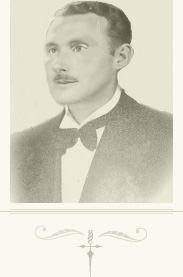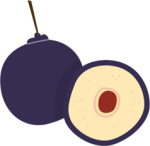About Professor Otto Andersen (Jaboticaba)

Otto Andersen, son of Jens and Rigmor Andersen, was born in Marquês de Valença (RJ), on December 12, 1916, but was raised in Resende, in the same state. In December 1940, he graduated in Agricultural Engineering from the Superior School of Agriculture and Veterinary of the State of Minas Gerais (ESAV), today the Federal University of Viçosa (UFV).
He began his professional life at the Instituto Agronômico de Minas Gerais (1941-1942). From 1942 to 1945, hired by Tecelagem Parahyba, from São Jose dos Campos (SP), he organizes the Parayba Farm, implements the breeding of breed pigs and develops, on a large scale, reforestation with eucalyptus. He worked for a year (1945-46) at Usinas Junqueira, in Igarapava (SP), where he developed activities related to forestry and coffee growing on the company’s farms.
On October 1, 1946, he was hired by ESAV to act as an assistant professor in the Department of Horticulture. Through a competitive examination, he became adjunct professor in 1952 and full professor of Fruit Culture in 1976.
Professor Otto holds the diplomas of “Master of Science” in Horticulture, obtained in 1955 on the Davis campus of the University of California; a Ph.D. in Plant Physiology, obtained on the same campus in 1957, and a professorship, obtained in 1958, in Viçosa.
Professor Otto’s teaching activities at UFV are impressive. In a survey carried out in October 1991, when he had completed 45 years of teaching, it appears that he had taught about 1,000 hours of classes for graduates, nearly 3,500 hours for graduates, and almost 2,500 hours of classes for mid-level technical costs. . Collaborates in the formation of dozens of groups of agronomists, who today work in several Brazilian states and even abroad. He has taught postgraduate courses for over 25 years and has mentored 16 master’s students.
As a researcher, he publishes more than 30 works, in addition to the book “Asfrutes silvestres Brasileiras”, written in co-authorship with his daughter Verônica. Although he initially worked in different branches of Agronomy, Fruticultura ended up winning his preference. He dedicated himself to researching several important technical aspects of this specialty, such as: the problem of unproductiveness in fruit culture; selective chemical control of weeds in orchards, nurseries and seedbeds; Effects of Growth Substances on Fruit Growing; methods and advantages of vegetative propagation; physiology and post-harvest handling of fruits (having installed its own laboratory, with orange processing house, cold storage and analysis laboratory); introduction, evaluation and identification of many of the fruit species with the greatest economic possibilities in the country (it surpassed the mark of 75 species and 400 varieties); and, and studies of pecan, macadamia and kiwi.
As an extensionist, he participates, by offering classes, in about 20 Farmers’ Weeks. He also participates in several reports on the television program “Globo Rural”, dealing with fruit trees, mainly macadamia nut, pecan and jabuticaba.
He is a member of six Brazilian and two American scientific societies and represents the UFV, presenting several works in congresses of these societies.
For his merits, he received the following distinctions: elected member of the Society of Sigma Xi (1957); UFV recognition diploma for 25 years of fruitful career performance (1965); diploma from the Diário de Minas for outstanding services to agriculture (1967); a tribute from the Sociedade Mineira de Engenheiros-Agronomos (SMEA) for the relevant services provided to technical-scientific research in agriculture (1967); diploma from SMEA, for services rendered to the advancement of the agronomic profession (1983); Medalha Bello Lisboa, for 25 years of devotion and relevant services rendered to UFV (1985); and honored as one of the founders of the Sociedade de Olericultura do Brasil, on the occasion of its 30th anniversary (1991).
Professor Otto Andersen will always be remembered for being part of the small group of professors who, with sacrifice and enduring all sorts of adversities, with months of delay in receiving salaries, transformed the small, poor and isolated ESAV into the thriving UFV. His memory remains in the person of his wife Felicitas Augusta Ulup Andersen, and daughters Veronica (forest engineer), Vivian (doctor) and Louise (veterinarian) and grandchildren Marcos and Isabela.
He died on December 26, 1997.
Translated to English
Source : http://www.personagens.ufv.br/?area=ottoAndersen
Clibas Vieira Ceres Magazine, Jan./Feb. from 1998
